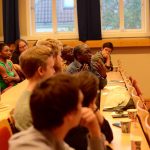LawTransform PhD Course
Effects of Lawfare: Courts and law as battlegrounds for social change (15- 24 August)
With two options of specialization: Effects of Lawfare concerning Child Rights and Health Rights.
The course page is available with further information about the course program and admission.
The course combines lectures specifically designed for the course and participation in lectures, panels, round-tables, and workshops of the Bergen Exchanges on Law & Social Transformation.
Students will receive 3 ECTS for participating in the course (80% of seminars), submission of paper abstract (150-300 words), and presentation of their own work to the other participants. Students who submit a publishable journal article (4,000-6,000 words, with an additional reading list of 500 pages, which can be from the elective reading list) by 14 October 2018 are awarded an additional 7 ECTS. (Postdoctoral researchers and MA level students will be accepted if space permits).
The PhD course is free of charge and open to applicant from Norwegian and international institutions on a first-come first serve basis. Participants do, however, have to cover their own travel and accommodation costs, as there unfortunately are no scholarships available.
Course leaders: Siri Gloppen (Comparative Politics, University of Bergen & LawTransform Director); Bruce Wilson (niversity of Central Florida/CMI); Camila Gianella (CMI); Marit Skivenes (Administration and Organization Theory, University of Bergen), Alicia Ely Yamin (Georgetown University Law Center) and Paola Bergallo (University of Torcuato Di Tella, in Buenos Aires).
Lecturers (tbc*): Malcolm Langford (University of Oslo/CMI); Jeroen van der Slujs (Philosophy of Science, UoB); Daniel Brinks (University of Texas, Austin).
******************************
Bergen Summer Research School
(11 – 22 June 2018)
Course on “Gender based violence: Rights as governance mechanisms and political tools”.
The application deadline was 15 February and there are some stipends available.
Course leaders are Henriette Aasen (UiB) and Torunn Wimpelmann (CMI) and lecturers include Jackie Dugard; Siri Gloppen; Hans Fredrik Martinussen; May-Len Skjelbrei; Liv Tønnessen and Vibeke Wang
A seminar and workshop on Abortion Rights & Health Effects: Global perspectives will be held at LawTransform on 1-2 February. Abortion laws are contested around the world with momentous changes occurring. The seminar features activist and scholars who were instrumental in securing a liberalization of the abortion law in Chile last year, and also scholars working on Ireland, Poland, Africa, the MENA region and India. The first day (1 February) will be a public seminar at the Bergen Resource Centre on Abortion Lawfare: Global perspectives. The second day (2 February) is a workshop to discuss Methodological approaches to studying health effects of abortion law. This is open by application and will be held at the Chr. Michelsen Institute.


